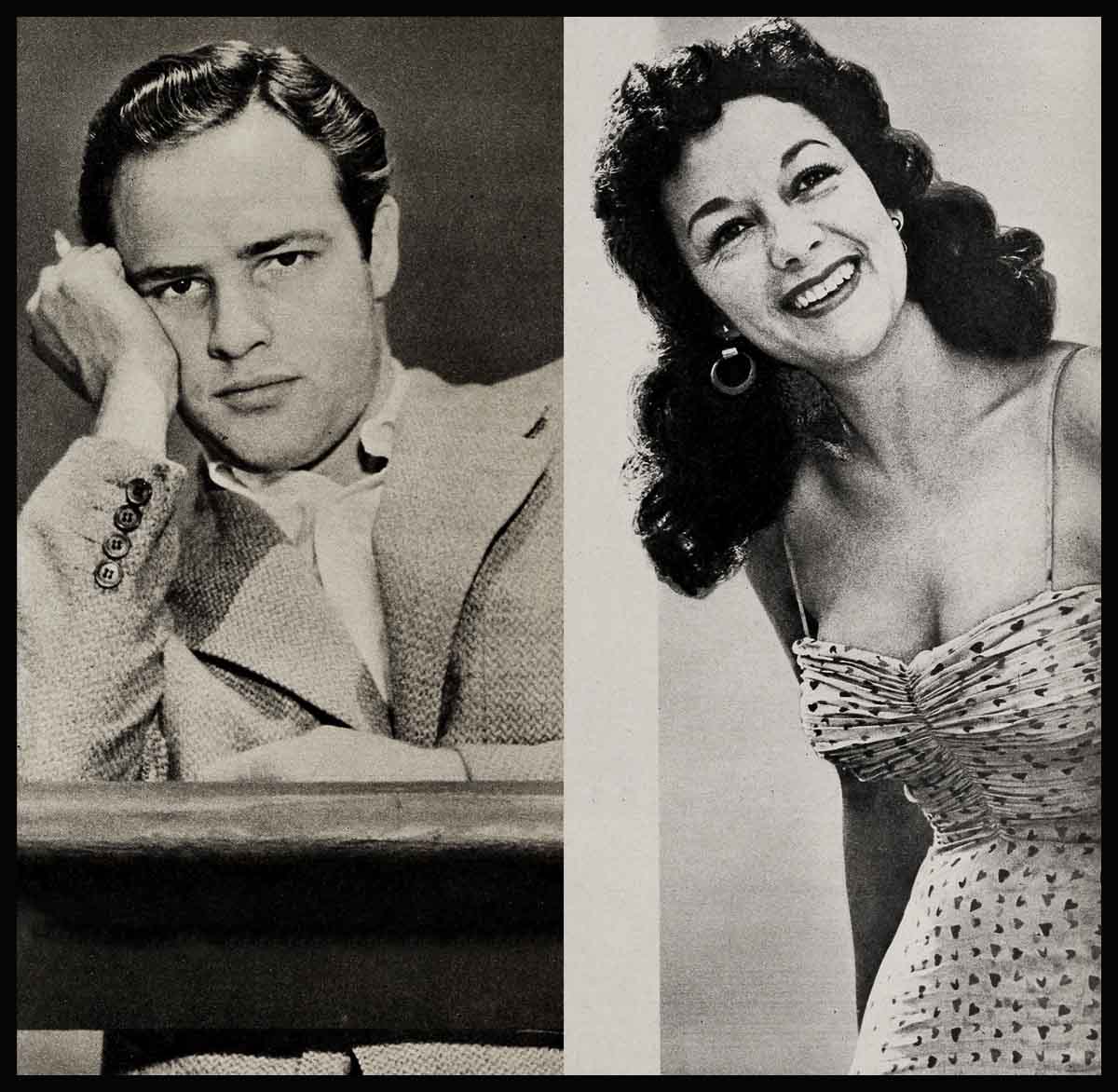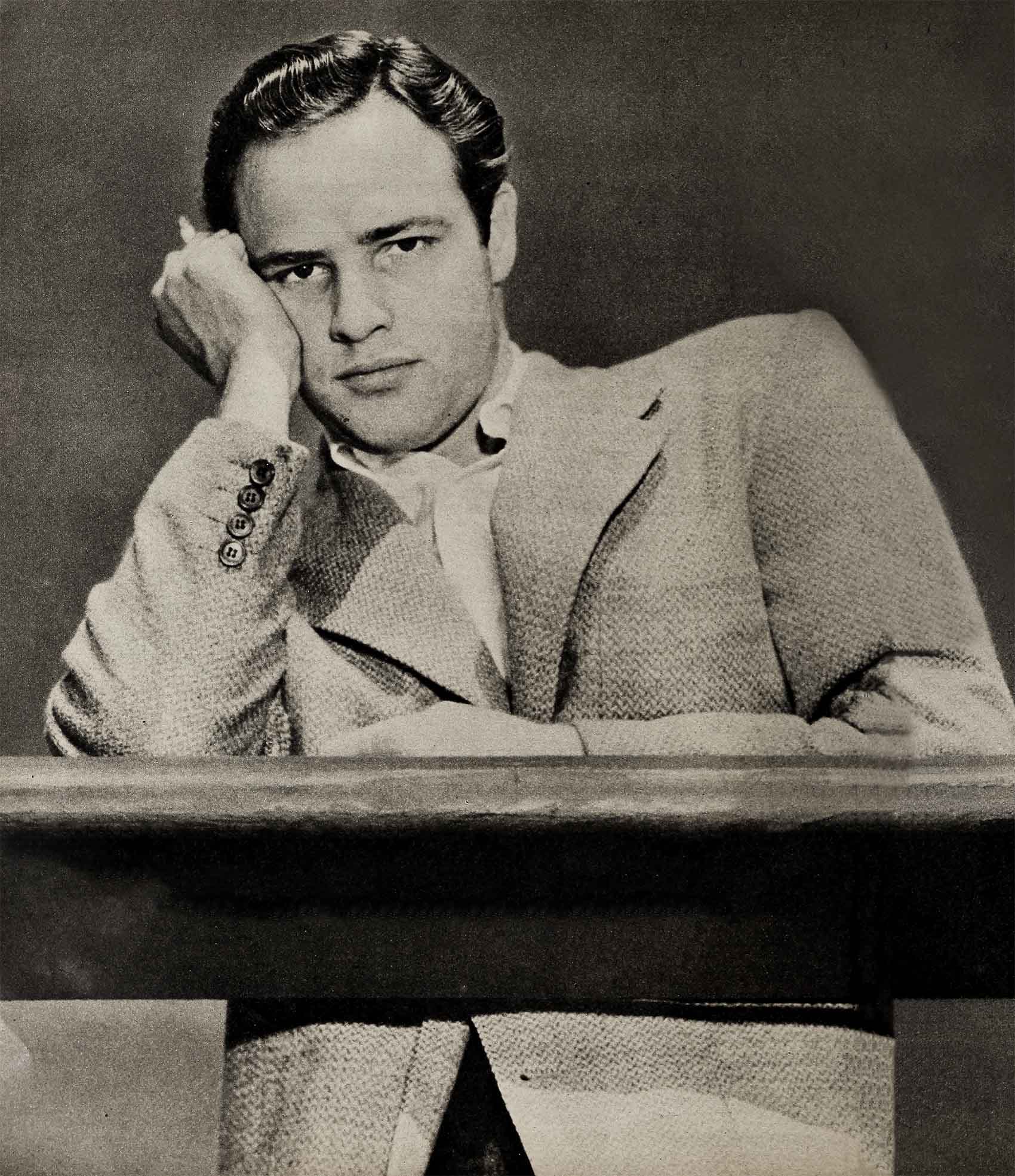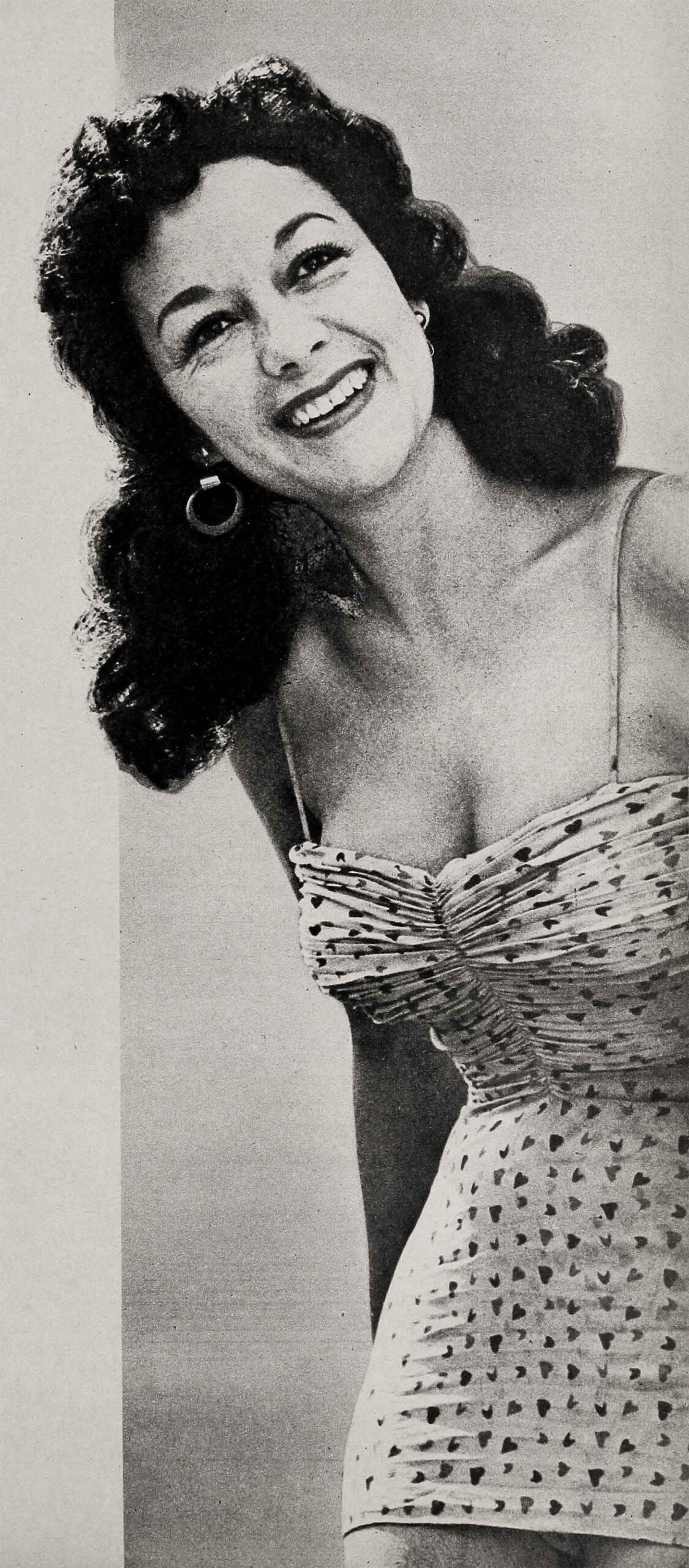
The Secret Romance Of Marlon Brando And Movita Castaneda
Marlon Brando is not a happy man. By nature a non-conformist, he is confused, tormented and supersensitive.
Like all men, he seeks contentment and laughter and joy. He decided to invite his best friends to a small party. He called Wally Cox, the Mr. Peepers of TV, Phil and Marie Rhodes, Sydney and Sandra Armes, all show folk, and ask them to meet him and Movita at his apartment in New York’s Carnegie Hall Building.
The purpose of the gathering was “to celebrate my three years of friendship with Movita.”
It was a warm and wonderful and unforgettable party, because everyone there understood that the keynote was love, the kind of love which is all too rare, the kind of love that calls for courage and sacrifice and gives pleasure and pain.
The guests danced and drank and sang, and toward the night’s end, Marlon Brando and Movita Castaneda found themselves relatively alone in a dimly-lit corner of the studio.
Marlon slipped one arm around Movita’s waist and his other hand into his pocket—to find his gift for Movita. It was a beautiful ring with a cluster of little diamonds. Marlon took Movita’s hand and slipped the ring onto her marriage finger.
“This is our three-year friendship ring,” he said softly.
Movita gulped hard and her eyes grew moist with tears.
“Thank you, darling,” she whispered. “Thank you.” And then she kissed him long and hard.
A short while after this party, a magazine came out with an article on Brando. In this article Marlon was libeled an alley-cat who had kicked Movita out of his apartment because she was offensive.
The article went on to say that Movita was so incensed at this behavior that she promptly married someone else. Later when she introduced Marlon to her teenage stepdaughter, the actor immediately moved in and had an affair with the girl.
There is not a grain of truth in this fantastic tale—and Movita is consulting her lawyer about filing a libel suit.
Marlon Brando is no angel. Everyone knows that and he is the first to admit it. He is original and exceptional, and for long periods of time, alone and filled with some nameless dissatisfaction, he is driven to seek the help of a psychiatrist. But essentially Marlon Brando is a kind man, a good man and a sensitive man. And it hurts him to know that he is being described as a psychotic bum, callous screwball and a swaggering nut.
When he reads that he loves his pet raccoon Russell more than he loves Movita, he is deeply hurt at such ridiculous lies. And he is amazed and hurt to read that his favorite hobby is carrying heavy cans of garbage to the roof and dumping them on the outdoor diners at Leon and Eddie’s, a restaurant in New York.
Last January, when Marlon had just finished a film.in New York, On The Waterfront, he was emotionally’ and physically’ exhausted. When he works he concentrates with such intensity that at the finish he has no strength left. But MCA, his agent, had signed him for the lead in The Egyptian. And 20th Century-Fox wanted to get it started at once.
So Marlon, with no-time off, came to Hollywood. The script was ready, and the talented young actor started to learn his lines. He found it difficult. He just couldn’t seem to concentrate. He felt badly confused about Movita. He wants to get married. At the same time there is so much of the world he hasn’t seen. And he wants his marriage to be perfect, to last forever. The relationship between marriage and freedom, responsibility and recklessness has him puzzled.

He went back to the script. He didn’t like it but a deal’s a deal, and he would try to see it through. At the studio he met Jean Simmons and that made it a little better. She would make the lines sound better and raise the level of the performance. His acting would have to compete with hers. He always likes that.
But somehow he couldn’t get his heart into the story. As he studied the script, it wouldn’t come alive. He would get annoyed with it, then with himself for getting annoyed.
He had been annoyed before in Hollywood when he had expected to be able to help some of his friends with small roles and he had been embarrassed when they did not come through as promised.
Marlon just couldn’t concentrate on The Egyptian. He was mentally disturbed, and on January 24 he returned to New York. The next day he reported to Dr. Mittlemann for psychiatric help. The doctor telegraphed the studio that Marlon Brando would not be able to work for a period of at least ten weeks.
When the wire arrived at the studio, the front office boys blew their tops. Said one, “He won’t get away with it. We’re going to sue. We’re going to recover the exact amount our auditors find the studio has lost and will lose through the delay in the production he has caused. We can’t understand the boy. Only a week ago he participated in a cast rehearsal and a reading of the script. The studio is convinced that his failure to appear has nothing whatever to do with the script or his in The Egyptian. The studio is compelled to protect its large investment.”
In New York, Brando heard about this. So they’re going to sue him? Well, they’ll have to find him first. How much are they going to sue for? Two million? Four million? He can’t make that picture. He’s tired. But how can you calm down when you’re dodging process servers?
One night a man came to the door of his apartment. “I have an announcement,” the man said, “about your nomination for the Academy Award.”
Brando smiled and opened the door. Quick as a flash, the little man slapped a summons into his hand. “I’m a process server. Consider yourself served.”
He was furious. How could he have been so stupid? Vanity. Pure vanity. Thought he’d won an Oscar for Julius Caesar. All he’d won was a summons.
That night Marlon told Movita about the summons. She laughed. He laughed. Movita told him not to worry. Lew Wassermann would take care of everything. Lew is at the MCA Hollywood office. The thing would work out. The studio needed someone to play Napoleon in Desirée. If Marlon played in Desirée, all would be forgiven. Marlon felt better.
Movita advised Marlon to relax. Why not take a walk along 57th Street? As they walked, Marlon realized it had been three years since Joy Lamont first introduced him to Movita in Taxco. He decided to celebrate with a party and give her a token of his love. A ring—that’s what he would like to give her.
Marlon gave his party for Movita and because it made her happy, he was happy, too. But the happiness was short-lived.

A few nights afterward, a call came from his Aunt Olive in Pasadena. “Don’t get alarmed, Bud, but your mother is sick. She and your dad stopped by here on their way back from Mexico. The doctor says it’s an attack of high blood pressure. He put her in the hospital.”
The Brando family is very close. Bud has always adored his two older sisters, “Frannie” and “Tid” (real names, Frances and Jocelyn), and all three children have always admired and loved their parents.
While Marlon was in New York under psychiatric treatment and was being sued for $4,000,000, his mother was slowly dying.
Night after night Marlon was told of her condition but usually in optimistic terms. Finally, when all attempts had been made to save Mrs. Dorothy Brando and she was not responding, Marlon was told that he should fly*to the coast.
The day he left New York, another Magazine article accused him of breaking up the marriage of actress Roberta Haynes and his own agent, Jay Kanter. In this article, Brando was branded a boy who spent all his spare time abusing Movita and a few dozen other girls.
Bud and his two sisters, Mrs. Eliot Asanof (Tid) and Mrs. Richard Loving (Frannie) arrived in Pasadena before their mother died on March 31.
Two weeks later, Marlon’s cousin, Myles Gahan, was killed in a plane crash north of Sacramento. Tim Gahan, thirty, was not only Bud’s cousin but because they were the same age, they had been inseparable boyhood pals. Tim was an American Airlines pilot who had been called back into the Air Force Reserve. He had cracked up while testing a jet.
The effect of these two deaths on Marlon was devastating. He cried for days. And it was Movita who saw him through his sorrow. It was she who encouraged him to return to the studio for two more pictures, Desirée and The Life Of Edwin Booth.
Her reward?
One magazine Said, “Movita is old enough to be Brando’s mother.” Another described her as “a man-crazy Latin.” According to Movita, “I never gave any interviews to these writers, so how could they possibly know my thoughts, my attitudes, my ways? Practically everything written about me has been wrong.”
Movita Castaneda was born on a train in 1921 between Sonora, Mexico, and Nogales, Arizona. She was educated in a Los Angeles parochial school and later attended Fairfax High School in Hollywood. She is one of eight daughters and two sons.
She got into show business by accident. When she was thirteen she accompanied the dancers Rosita & Moreno to San Francisco. Movita was asked to substitute for a sick performer.
“Just go out on the floor with your guitar,” she was told, “and sing.”
Pandro Berman, an RKO producer, caught the act and believed that Movita was old enough to work. He offered her $125 a week to play in Flying Down To Rio. Over parental objections, Movita accepted.
She wasn’t happy at RKO. Dolores Del Rio was there at the time, and apparently Dolores had the idea that Movita was being groomed as her successor. Movita quit the movies and went back to school. But a few months later MGM asked her to test for Mutiny On The Bounty. When Irving Thalberg saw the test, he hired her.
Movita was fourteen when she made Mutiny and fifteen when she met Jack Doyle, an Irish prizefighter, at a party.
Doyle wasn’t much of a pugilist but Movita found him irresistible. “After all,” she says, “I was very young and naive. He was very handsome and’ romantic. I believed everything he said. We were married twice, once in Ensenada and once in Dublin!” They were in Britain in 1939 and in London in the blitz.
In 1941, when Movita was six months pregnant, she “was bombed out of her home. She lost that child. In 1942 when she was pregnant again her husband sent her to Southampton. There was no escape. Southampton was bombed and Movita was reported dead. But they picked her up out of the rubble, hardly alive. Again she lost her child.
In 1944, after five years of marriage, Movita and Jack Doyle decided to separate.
“We just couldn’t get along. He was nice but he was essentially a playboy. His friends didn’t appeal to me. So I joined ENSA, the English equivalent of our USO, and I toured the front entertaining troops. I did some picture work, too.”
In 1947 Movita returned to Hollywood. She played a few feature roles and then went south to visit her relatives. Back and forth she went between Hollywood and Mexico, working in films sometimes.
In Taxco, Mexico, one afternoon when Fox was getting ready to start Zapata, Movita was introduced to Marlon Brando.
Brando had come down to Mexico early in order to study the Mexican people. He is a perfectionist, and before playing a Mexican, he wanted to immerse himself in the Mexican community.
Joy Lamont, one of Movita’s friends, knew Marlon before he came to Taxco. It was she who introduced them in the town square. They took to each other at once and this attraction developed into love. When Marlon went back to Hollywood Movita went, too.
Movita never tried to take advantage of Marlon’s fame, never insisted on recognition as his companion. Both of them avoided reporters like the plague.
When Marlon went to New York, Movita followed. He introduced her to his friends and to his family. Everyone liked her then and they like her now.
One of his friends says about Movita, “I honestly think she’s done more for Brando than practically anyone. She’s matured him. She’s showed him understanding. At a time when the gossip columnists were calling him nuts and creating anecdotes about his strange behavior, she was telling him that there was nothing wrong with him, that every man was stuck with his nature, and that he would have to adapt himself to find happiness.
“Bud is a good guy and Movita is a good girl. They complement each other, need each other. It’s a wonderful friendship.”
Movita knows when Brando is putting on an act. She realizes that his swaggering behavior is merely compensation for his hypersensitivity.
She loves Marlon for his fundamental goodness. Ask any actress or actor who has. played with Brando what they think of him, not as a performer but as a human being. You will get such answers as, “He’s the most considerate man I’ve ever met . . . He doesn’t have a selfish bone in his body . . . He will do anything he can to help.”
Movita says that she has no desire to marry Marlon. “I only want to be his friend, to help him find happiness. and integration.”
Perhaps she’s had enough of marriage. Perhaps not. Either way, she is much too smart to pressure Marlon into a wedding.
“With Marlon,” she once said, “things spring from within. His heart tells him what to do, much more than his mind does. Not that he isn’t intellectual, because he is—more than people seem to think. But he is the kind of man who obeys his instincts. They are almost always right.”
Marlon Brando comes from a happy home. When he gets married he wants that marriage to last. Right now he doesn’t know whether or not he has the qualities necessary to make a good marriage.
This is one problem with which no one, possibly not even Movita, can help him.
THE END
—BY STEVE CRONIN
It is a quote. MODERN SCREEN MAGAZINE AUGUST 1954




